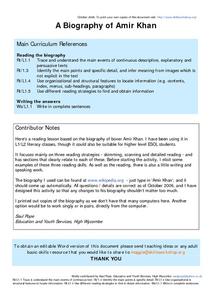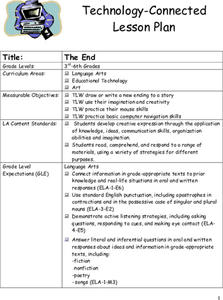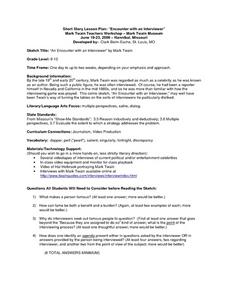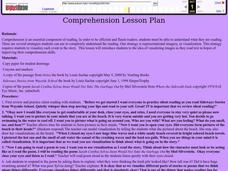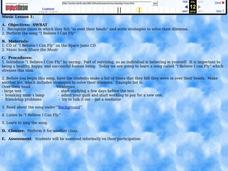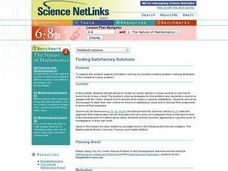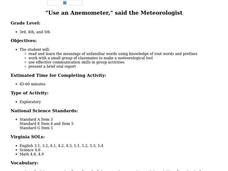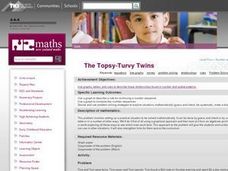Curated OER
A Biography of Amir Khan
In this literature worksheet, students read a biography about Amir Khan, a middleweight boxer who won an Olympic bronze in Athens. They identify whether each statement is true or false. Then, students look at his career and respond to...
Curated OER
Visions of Pigs
Learners examine the importance of silent reading before practicing the technique of visualization. They listen while the teacher leads they through a visualization exercise in which they imagine they are at the beach. Next, they...
Curated OER
The End
Students listen as the teacher reads a story. Pictures are displayed as the teacher reads the story. Students jot down ideas for the story ending, and create an illustration to compliment their story. Student story endings and...
Curated OER
Letters
Students read letters the could have been written by Robert E.Lee and his friend John giving students an ideas of what students from a different era thought of George Washington. They discuss history from a child's view point.
Curated OER
The History of Thanksgiving Day
Third graders study the history of Thanksgiving. In this holiday lesson plan, 3rd graders read about the history of Thanksgiving, complete vocabulary activities, and write a journal entry from the point of view of someone who lived...
Curated OER
Encounter with an Interviewer
Students read the Mark Twain short story, Encounter with an Interviewer. They study "the interview" and discuss the role of the interviewer and the person being interviewed. They conduct mock interviews, constructing questions and...
National Behaviour Support Service
Academic Vocabulary Building Activities
Suggestions for using Roberto Marzano's six-step approach to academic vocabulary instruction are detailed in a packet that includes graphic organizers, worksheets, and activities.
Curated OER
Linking Kwanzaa to Technology and History
Seventh graders use the Internet to research the holiday of Kwanzaa. Using the information, they create a brochure to promote the holiday to others. They email the information to a friend to end the lesson.
Curated OER
Elmer by David McKee
Students explore individual differences. In this literacy and self-esteem lesson, students listen to the story Elmo by David McKee, then describe what characteristics make Elmo special. Students complete a T chart showing how Elmo looked...
Curated OER
Comprehension
Learners identify that comprehension is an essential component or reading and in order to be efficient and fluent readers. They interpret what they have read through various strategies. Finally, students use one of the strategies,...
Curated OER
Imagine This
Students practice visualizing as they read to aid comprehension. They then read a chapter in their history book and visualize what they read so that they can answer comprehension questions about the chapter.
Curated OER
The Bananas Problem
Students read a fraction word problem and find the solution. In this fraction word problem lesson, students read the word problem about fractions and find a solution. Students use the links to find different solutions to the problems.
Curated OER
Spinning Your Wheels
Students read various articles related to transportation and land use. They cite textual references as they engage in panel discussions, shared inquiry discussions and debates. They write a persuasive essay on the topic.
Curated OER
Music
Students sing "I Believe I can Fly". In this singing instructional activity, students discuss strategies for solving problems and perform the song.
Curated OER
Finding Satisfactory Solutions
Students explore the creative aspects of problem-solving and practice creative problem-solving strategies in the context of a story problem. They decide where to locate ice cream stands in a town so that no one has to travel too far to...
Curated OER
Great Gullah Story Telling Packet
Sixth graders examine the Creole language known as Gullah which is a form of speech comprised of a number of unrelated languages. They determine how slaves used this to communicate so that slave masters would not be able to understand...
Curated OER
What Kind of Reader Are You?
Students write a personal reading history about how reading has influenced their lives. They identify their strengths, weaknesses, and preferences as readers through a survey. Students examine what goes on in their minds while they read...
Curated OER
"Use an Anemometer," said the Meteorologist
Students work in groups to make an instrument the Meteorologists use to measure the speed of the wind after the teacher reads them a poem about the wind. Students then review vocabulary that they studied from their lesson.
Curated OER
Summing It Up Can Be Fun!!
Pupils observe and demonstrate the process of summarizing text. As a class, they silently read an article about panda bears from "Ranger Rick" magazine and answer comprehension questions. They answer the five "W" questions, and write a...
Curated OER
When were you selfless today?
Students, after reading and analyzing the poem, Selflessness of Mind, by Joe Gurknecht, brainstorm and discuss specific recent student acts of selflessness. They develop strategies to tie those acts of selflessness to themselves and...
Curated OER
Grabbing For Vowels
Students explore the short /a/ sound. Taking turns, they pick short /a/ sight word apples from a bulletin board apple tree. Each student reads the word and then chooses someone from the class to identify the /a/ sound in the word.
Curated OER
Tree of Giving
Students work together as a team to solve the hypothetical common problem of litter. They give examples of organizations that focus on trying to help others in significant ways (volunteers). Each group maps out their strategy, a tree...
Curated OER
The Topsy-Turvy Twins
Fourth graders read the problem and brainstorm for ways to solve the problem - list these on the board for the students to refer to as they solve the problem. They work in pairs and focus on the strategy selected.
Curated OER
The Escape
Young scholars find strategies for investigating number problems. They find a common multiple of a group numbers. The teacher introduces the problem and students read and think about it. In groups, young scholars discuss the problem...
